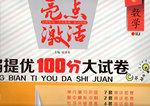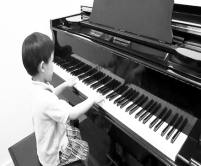
— When is Henry's birthday party, Lynn?
— The 18th, __________about three o'clock in the afternoon.
A.on B.at C.to D.in
 亮点激活精编提优100分大试卷系列答案
亮点激活精编提优100分大试卷系列答案科目:初中英语 来源:2014-2015学年广东汕头市毕业生学业考试英语试卷(解析版) 题型:单项填空
—There are many clubs in our school that I can’t decide which one to attend.
— I a member of the dancing club for over a year. Would you like to join us?
A. such; have been B. so; have been
C. such; have become D. so; have become
查看答案和解析>>
科目:初中英语 来源:2014-2015学年北京市顺义区中考一模英语试卷(解析版) 题型:阅读理解
A mother wanted to encourage her son to play the piano. She bought tickets to the concert of a great pianist. When the evening arrived,they found their seats near the front of the concert hall and looked at the big piano waiting on the stage(舞台). Soon the mother found a friend to talk to and her son ran off.
At eight o’clock, the lights in the hall became weak, and the concert was set to start. The mother began to look for the boy. Then, she saw her 6-year-old son on stage. He was on the piano bench playing Twinkle, Twinkle Little Star.
The mother was very amazed. Before she could get her son back, the famous pianist himself was on the stage and quickly moved to the piano.
“Don’t stop. Keep playing,” he said kindly to the boy. The great pianist reached down with his left hand and began filling in the bass (低音部) part of the song. Soon, his right arm reached around the other side and played a beautiful piece of music. Together, the old pianist and the little boy impressed people with their beautiful music.
In all of our lives, we receive helping hands — some we notice, some we don’t. Equally we ourselves also have lots of chances to give a helping hand to others — sometimes we want people to know, sometimes we don’t. Little of what we all achieve comes without others’ help. What we receive we should give back.

1.The mother took her son to the piano concert because _____.
A. her friend sent them two tickets
B. the pianist invited them there
C. she wanted to develop his interest in piano
D. her son liked the pianist very much
2.When the mother found her son playing on stage, she felt _____.
A. happy B. encouraged
C. interested D. surprised
3.What did the pianist ask the boy to do?
A. To go back to his mother.
B. To keep playing the piano.
C. To play the bass part of the song.
D. To watch him play instead.
4.What does the story tell us?
A. It is good to give a helping hand to others.
B. Great people always like to help others.
C. It is important to give a child a lesson on stage.
D. A mother should take good care of her child.
查看答案和解析>>
科目:初中英语 来源:2014-2015学年北京市房山区燕山中考一模英语试卷(解析版) 题型:阅读理解
It was a cold winter day. A woman drove up to the Rainbow Bridge tollbooth. “I’m paying for myself, and for the six cars behind me,” she said with a smile, handing over seven tickets. One after another, the next six drivers arriving at the tollbooth were informed, “Some lady up ahead already paid your fare.”
It turned out that the woman, Natalie Smith, had read something on a friend’s refrigerator: “Practice random (随意的) kindness and senseless acts of beauty.” The phrase impressed (使某人印象深刻) her so much that she copied it down.
Judy Foreman saw the same phrase on a warehouse wall far away from home. When it stayed on her mind for days, she gave up and drove all the way back to copy it down. “I thought it was beautiful,” she said, explaining why she’d taken to writing it at the bottom of all her letters, “like a message from above.” Her husband, Frank, liked the phrase so much that he put it up on the classroom wall for his students, one of whom was the daughter of Alice Johnson, a local news reporter. Alice put it in the newspaper, saying that though she liked it, she didn’t know where it came from or what it really meant.
Two days later, Alice got a call from Anne Herbert, a woman living in Marin. It was in a restaurant that Anne wrote the phrase down on a piece of paper, after turning it around in her mind for days.
“Here’s the idea,” Anne says. “Anything you think there should be more of, do it randomly.” Her fantasies include painting the classrooms of shabby schools, leaving hot meals on kitchen tables in the poor part of town, and giving money secretly to a proud old lady. Anne says, “Kindness can build on itself as much as violence (暴力) can build on itself.”
The acts of random kindness spread. If you were one of those drivers who found your fare paid, who knows what you might have been encouraged to do for someone else later. Like all great events, kindness begins slowly, with every single act. Let it be yours!


1. Why did Natalie Smith pay for the six cars behind her?
A. She had seven tickets.
B. She hoped to please others.
C. She wanted to show kindness.
D. She knew the car drivers well.
2. Judy Foreman copied down the phrase because she ___ .
A. thought it was beautifully written
B. wanted to know what it really meant
C. decided to write it on a warehouse wall
D. wanted her husband to put it up in the classroom
3.Who came up with the phrase according to the passage?
A. Judy Foreman. B. Natalie Smith.
C. Alice Johnson. D. Anne Herbert.
4. What can we infer from the last paragraph?
A. People should practice random kindness to those in need.
B. People who receive kindness are likely to offer it to others.
C. People should practice random kindness to strangers they meet.
D. People who receive kindness are likely to pay it back to the giver.
查看答案和解析>>
科目:初中英语 来源:2014-2015学年北京市房山区燕山中考一模英语试卷(解析版) 题型:单项填空
— Excuse me. ______ is it from here to the Bus Change Center?
— Quite near. It’s only about half a kilometer.
A. How often B. How soon
C. How much D. How far
查看答案和解析>>
科目:初中英语 来源:2014-2015学年浙江台州书生中学八年级下期中英语试卷(解析版) 题型:阅读理解
Roast (烧烤) is very famous in Brazil. Customs (顾客) just sit , waiting for waiters to send them all kinds of meat. If you like , you take one ; if you don’t , the waiters pass you . If you don’t give any messages of stopping , they will go on.
One day when I was in Brazil , I went to a restaurant to try the roast . After I took my seat, the waiter gave me a sign with the color “red” on the side and “green” on the other . I said “thank you”, then the waiters began to serve me .My plate was already full, but the waiters still kept on serving me more. I thought I had to eat more quickly . But to my surprise, the waiters still kept on serving more. Then a waiter found out the reason. He helped me turn the sign over, with red outside . When I finished , I found the waiter didn’t take a look at me . Do you know Why? It’s just like the traffic lights in the street . How wonderful !
1.When did the waiters give me a sign?
A. After I went into the restaurant
B. When I sat down
C. When I tried the food
D. When my plate was full
2.When I began the meal , the color red was .
A. inside B. outside
C. not seen D. not on the sign
3.How did the waiter know you wanted food?
A. Put the “green” side outside.
B. Take the sign away.
C. Put the “red” side outside.
D. Keep the waiters away.
4.Why didn’t the waiters serve me later ? Because .
A.I didn’t call them B.I didn’t want more
C.the red was outside D. they didn’t like me
查看答案和解析>>
科目:初中英语 来源:2015年初中毕业升学考试(江苏苏州卷)英语(解析版) 题型:单词拼写
词汇检测(共10小题;每小题1分,满分10分)
根据下列句子及所给汉语注释或通过上下文,在答题卡上标有题号的横线上,写出空缺处各单词的正确形式。每空只写一词。
1.Helen (点头) with a smile when she met me.
2.Becky (明智地) decided to tell us the truth.
3.Justin lay back and enjoyed the (安宁) of the summer evening.
4.The bank is (在…对面) the supermarket, on the other side of the road.
5.My cousin used to be very interested in (收集) postcards.
6.Edison is one of the greatest (发明家) in the world.
7.Mr. Green often (惩罚) his children by not letting them play games.
8.— Thanks for lending me the book Black Beauty.
— Don’t it.
9.— What’s the of the elephant?
— About two tons.
10.— Have you drunk all the milk?
— Yes. Look, the bottle is now.
查看答案和解析>>
科目:初中英语 来源:2015年初中毕业升学考试(江苏苏州卷)英语(解析版) 题型:单项填空
— Where is Joan?
— She a novel in her study.
A. has read B. reads
C. will read D. is reading
查看答案和解析>>
科目:初中英语 来源:2015年初中毕业升学考试(贵州安顺卷)英语(解析版) 题型:单项填空
—Don’t be late for school next time, ______? —No, I won’t.
A. are you B. will you C. do you D. did you
查看答案和解析>>
湖北省互联网违法和不良信息举报平台 | 网上有害信息举报专区 | 电信诈骗举报专区 | 涉历史虚无主义有害信息举报专区 | 涉企侵权举报专区
违法和不良信息举报电话:027-86699610 举报邮箱:58377363@163.com